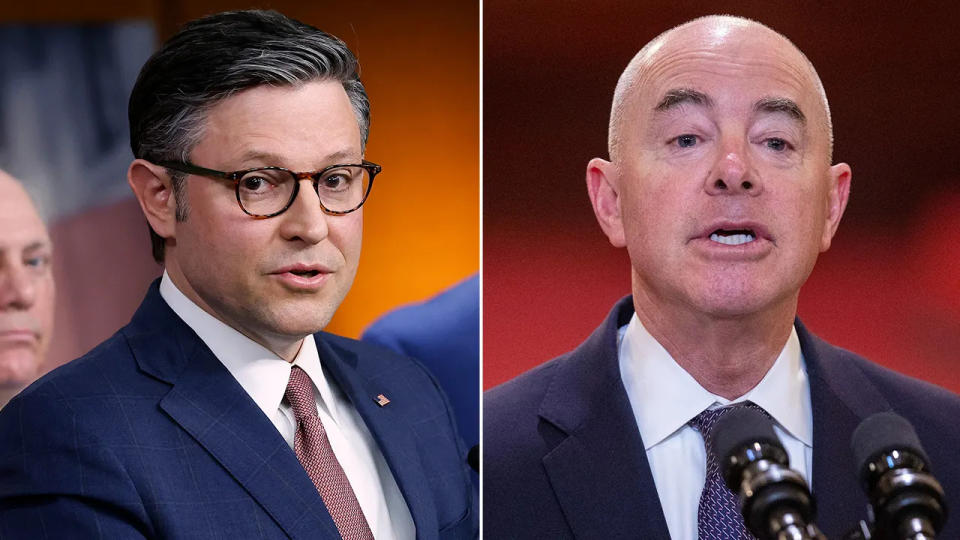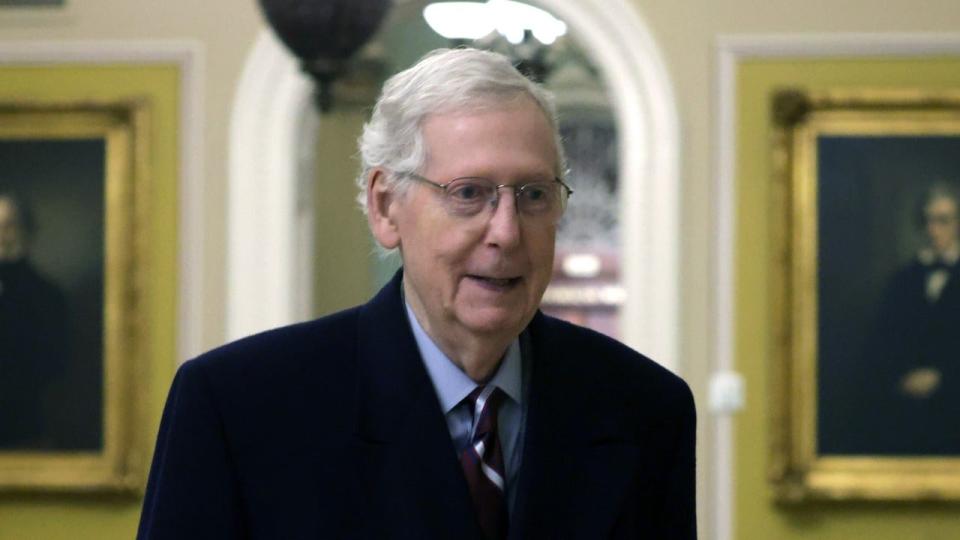Why the House delayed sending Mayorkas impeachment articles to the Senate to begin trial
Only in Congress can you be late and early at the same time.
First, there was criticism that House Speaker Mike Johnson, R-La., didn’t push sending the articles of impeachment for Homeland Security Secretary Alejandro Mayorkas after the House voted to impeach him in February.
The argument was that the Senate wasn’t ready yet. Plus both chambers wanted to make sure they waded through two sets of spending bills to avoid partial government shutdowns.
Then, a coalition of Senate conservatives began haranguing Johnson to delay sending the articles over to the Senate. This came nearly two weeks after Johnson announced the House would send the articles to the Senate by April 10.
Here’s the statement from Johnson’s office sent on March 8: "On April 10th, the House will send the Senate our duly passed articles of impeachment against Secretary Mayorkas. If he cares about the Constitution and ending the devastation caused by Biden’s border catastrophe, Senator Schumer will quickly schedule a full public trial and hear the arguments put forth by our impeachment managers."

Senate Majority Leader Chuck Schumer, D-N.Y., then announced that the chamber would swear-in senators as jurors on Thursday, April 11. It was intimated that Schumer would then move to dismiss the articles — if he had the votes. Thus, if Schumer teed up a vote to dismiss or table the articles, the Democrats could short-circuit the trial by late Thursday afternoon. There would be no formal presentation of the articles of impeachment by the House "managers" (prosecutors). And the Senate would never advance to an actual up/down vote, rendering judgment for Mayorkas
But as FOX News' Aishah Hasnie scooped on Tuesday, Senate Republicans were demanding that Johnson throw on the brakes — even though the plan was set in stone days ago.
Fox contacted multiple House impeachment managers as to if they knew what was happening. All three had not heard of a delay. In fact, on one text message, one manager mistakenly responded to yours truly, asking someone in leadership if what Fox was reporting was true.
Even though Rep. Marjorie Taylor Greene, R-Ga., is one of the impeachment managers, she learned of the delay from FOX's reporting.
"The last thing I heard, and I’m an impeachment manager, and those articles of impeachment have my name on them. I have not been told that we may be holding them now. You’re the one that told me that. So apparently you’re getting the news quicker than I am," Greene said Tuesday afternoon.
THE HITCHHIKER'S GUIDE TO MAYORKAS' IMPEACHMENT TRIAL
Aides to Johnson appeared to be trying to get clarity as well. At first, one aide said they had not heard that. Later, the aide told FOX there were conversations. Then FOX was told the aides wouldn’t push back on reporting that they were holding the articles until next week. Then a statement came from Johnson’s office.
"To ensure the Senate has adequate time to perform its constitutional duty, the House will transmit the articles of impeachment to the Senate next week. There is no reason whatsoever for the Senate to abdicate its responsibility to hold an impeachment trial," said Johnson a spokesman.

Senate Minority Leader Mitch McConnell, R-Ky., also didn’t appear to be dialed-in when asked about a potential delay in initiating the impeachment trial.
You’ll find more whiplash on Capitol Hill than at a chiropractic clinic. But what political purpose does the back and forth serve? Who benefits? The outcome will likely be the same in the end.
And Johnson bowing at a moment’s notice to Senate conservatives who asked for a delay — apparently going over the head of McConnell — demonstrates three things. First, Senate conservatives were late to the table to push this. They knew the start of the trial since late March. This was likely an idea they only engineered in the past few days. Secondly, this reflects McConnell losing ground to conservatives in his conference. That trend has been ongoing for some time now. It’s why McConnell even declared he could read the room politically when he announced over the winter he would step aside as Republican Leader at the end of the Congress. Finally, this episode also underscores concerns some Republicans have about Johnson. They doubt that he’s truly in charge — even if they agree with the ultimate decision.
"That is a failure of leadership. Real leaders do not lead their members where they’re blind," said Greene. "Any smart person watching this broadcast right now knows that successful have a plan and they’re able to execute it. Leaders have a plan and they lead their members. This is a complete failure of Mike Johnson."
Thus, Republicans score a few more days to talk about the impeachment of Mayorkas and how the Senate is likely to short circuit the trial. This earns a few more news cycles and some conversations on the Sunday shows — especially if the articles head over on Monday.
Republicans are also able to propound their talking points that Schumer would set "a terrible precedent" by ending the trial quickly and curating the narrative that Democrats "aren’t serious" about border security or are giving a tacit endorsement to Mayorkas. The GOP also thought there might be some attendance problems for the vote to dismiss. By rule, the trial cannot begin until 1 p.m. So if the Senate was going to formally start the trial part of the production on Thursday afternoon, the Senate may have quickly dismissed the articles and senators would have left the Capitol for the weekend. This retooled scenario maximizes focus on the impeachment articles by buying more time.
That said, there is another issue afoot: FISA Section 702 and aid to Ukraine. We’ll start by noting that many arch-conservatives oppose renewing FISA and there are disagreements about reforms. Moreover, some on the right are also opposed to assisting Ukraine.
MARJORIE TAYLOR GREENE'S RED LINE ON SPEAKER JOHNSON
It’s possible that efforts to renew the foreign surveillance program (known as FISA Section 702) could blow up on the House floor. That would compel the Senate to pivot to a short-term reauthorization of the program. The Senate would then pass the plan along to the House.
But here’s the other issue: There is still no concrete scheme to tackle aid to Ukraine in the House. Floor time is at a premium. Dragging out impeachment takes focus off the House as it struggles to deal with Ukraine. The initial gameplan was for the House to do a Ukraine aid bill next week — one which differs from the Senate passed bill. It’s still unclear if the House can even pass a Ukraine bill. But the Senate will likely accept whatever the House can manage on Ukraine. Therefore, punting the impeachment trial into next week rather than clearing the decks this week puts a squeeze on the Senate. Especially if the House is able to approve a DIFFERENT Ukraine bill. That could make it challenging for the Senate to align with a potential House bill.
Thus, delaying the impeachment trial until next week serves several goals of conservatives. And stretching it out maintains the spotlight on Mayorkas and the border: a key tenet of the GOP’s political agenda for fall.
Original article source: Why the House delayed sending Mayorkas impeachment articles to the Senate to begin trial

